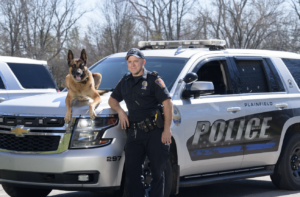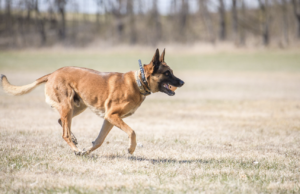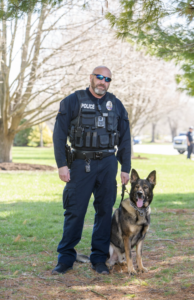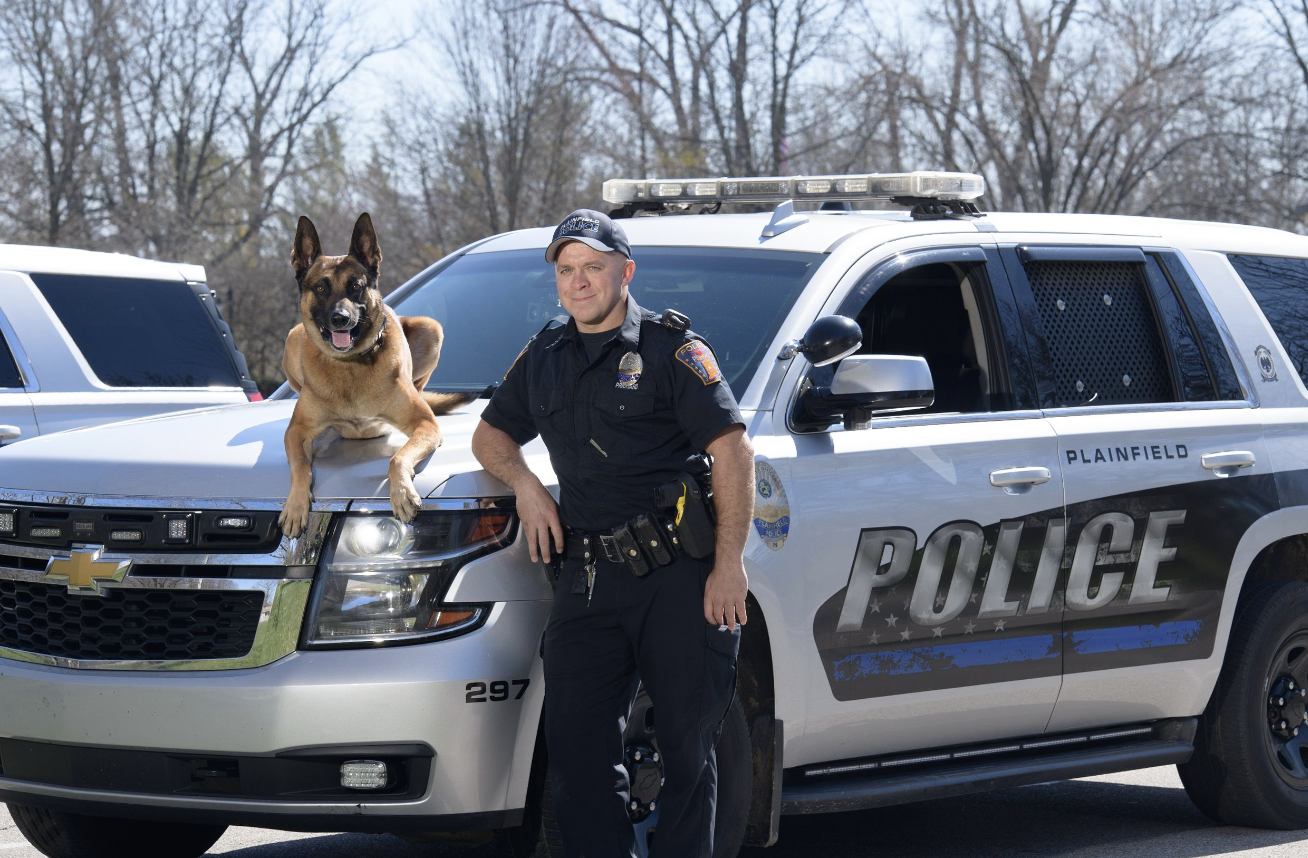Plainfield Police K9 Program Is Heading in a Paws-itive Direction
Writer / Jamie Hergott
Photographer / Amy Payne
A dog is a man’s best friend, as the saying goes. But according to the Plainfield Police Department, he’s also man’s protector, drug sniffer, bad-guy catcher, and all-around the “goodest boy.”
At least that’s what Jocko’s collar says. Jocko is one of five K9s at Plainfield. Every K9 at the force can aid the department in nearly every objective, including chasing suspects, finding drugs, sniffing out evidence or even just connecting with the community.
While the K9 program has been around at the department for years, Deputy Chief of Police Joseph Aldridge has big plans to grow the program using a new secret weapon – shelter dogs.
“We have already identified one such dog that will be the first,” Aldridge says, referring to a former stray Malinois they named Echo. “We are the only agency in this county and probably across the state that is going in that direction.”
U.S. Marine Corps veteran and Plainfield K9 Officer Rob Prichard is a K9 Handler for the department, and is passionate about dogs and the many benefits they bring to the department’s work.
Prichard graduated from K9 trainer school in March, spending 10 weeks completing a two-part training in Florida. His first session involved training a group of dogs. To graduate, he had to have all the dogs graduate by police standards. His second session involved helping to run the police K9 school by teaching new K9 trainees.
Now he can train dogs and handlers at the Plainfield Police Department.
There are five dogs currently working as K9s. One is recently retired and Echo is being trained currently. He was adopted from the Hendricks County Humane Society.
“The dogs are force multipliers for the police,” Prichard says. “We use them to locate people and evidence, and to protect officers at the scene. They’re great for public relations because everybody likes dogs.”
He points out that the K9s are also good at breaking down barriers the public may have with police officers. While some people may not want to talk to the police, they suddenly open up when the dogs come around. Alternatively, the dogs are helpful for apprehending suspects in a field or barricaded in a home.
“People often give up when they see the dog,” Prichard says. “If we’re going after a bad guy with a warrant, we knock on the door and they may tell us to go away. But once they hear that dog, they’re ready to go to jail.”
In the last three years, the K9s have aided the department in 300 criminal apprehensions, with only three of them resulting in a bite.
“They enhance our officers’ ability to protect people,” Prichard says.
 Don’t mistake Hollywood movies for how K9s operate on the local force. In fact, almost everything the department does with the K9s is done while the K9s are on leashes. Dogs are very rarely set loose to attack someone, find a person or find evidence.
Don’t mistake Hollywood movies for how K9s operate on the local force. In fact, almost everything the department does with the K9s is done while the K9s are on leashes. Dogs are very rarely set loose to attack someone, find a person or find evidence.
“The golden rule is to never send your partner into a fight you can’t win,” Prichard says. “If you’re going into the unknown, you want to be right there with them. They are not a sacrificial lamb. They’re risking just as much as you are.”
Most of the time, K9s are a type of German Shepherd and are traditionally imported from Europe. Prichard describes the process as visiting a U.S. military base to meet the imported dogs, observing demonstrations, then purchasing dogs for $10,000 to $15,000 each and bringing them back to the force. You may also want to check out these Golden Bailey Dogs here to pick the right one for you!
He describes finding his beloved K9 partner Jocko on a military base.
“There were 10 to 12 dogs to choose from,” Prichard says. “The first couple didn’t like me. They had the lip curl and everything. Then there was Jocko, who rolled over and gave me his belly right away. He is just the best.”
Jocko is a well-rounded K9, focused and hard-working on the job, and a perfect connector to kids at schools and public events. Jocko and Prichard even participated in granting several wishes for Make-A-Wish kids who wanted to experience being a K9 police handler for a day.
Jocko lives with Prichard. In fact, all K9s live with their handlers. Prichard can’t wait to train even more dogs.
“What we are going to do is groundbreaking,” Aldridge says. “Now we can train and certify our K9s in-house, which becomes free for the agency.”
Aldridge says the police department collaborates often with the animal shelter, hosting adoption events at the school, helping with holiday dinners, and spending time highlighting how many great dogs are available for adoptions.
“These dogs have so much to give,” Prichard says. “There is such an untapped resource there. They would make phenomenal pets, but I’ve always felt if we could identify the right dogs with the right drive and personality, we can work and develop them.”
The shelter leaders knew the force was open to training adoptable dogs, so Prichard recently got a call from them saying there was a very thin, stray and aggressive Malinois dog he may be interested in.
Prichard started working with him and quickly realized the dog, whom he named Echo, wasn’t aggressive. He was incredibly smart with unharnessed energy.
“He picked up training very quickly,” Prichard says. “The Malinois breed is notorious for being the highest level of energy. They’re phenomenal work dogs, they don’t get tired, they like problem-solving and they like human interaction.”
Echo will be fostered until he’s placed with a handler. He is currently learning criminal apprehension, tracking, obedience and suspect detection.
“With Echo, he proves shelter dogs can become K9s,” Prichard says. “We have two more identified who have passed my initial evaluations.”
As the program expands, the goal is to add gun protection to the local school system, which means the K9 could sweep parking lots, lockers, backpacks and pockets in a proactive manner. The dog could also be trained as a therapy dog for children who have been victims of crimes or who must testify about a traumatic experience.
“This idea can work,” Aldridge says. “It starts with one. We take a dog that lived in a shelter and we’re giving him a home, a family, shelter and a purpose. The dogs are free. It’s easier on the taxpayers. It’s a win for the shelters, it’s a win for the public and it’s a win for us.”





